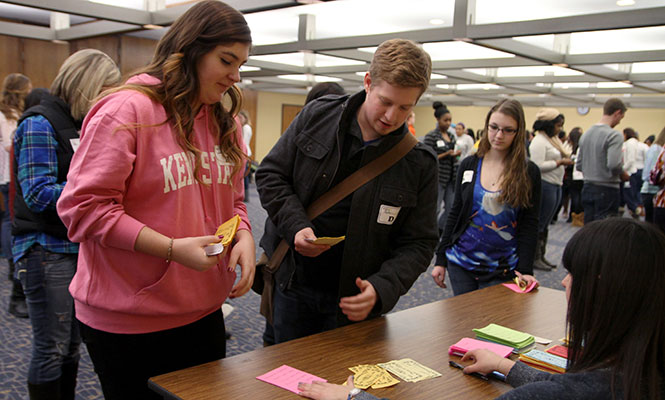Game of Life simulation demonstrates cultural inequality
Freshman speech pathology and audiology major, Dylan Still-Pepper (right), and freshman Sarah Lovejoy (left) recieve a baby girl at The Game of Life event on Wednesday, Jan. 29, 2014. The event was a recreation of the popular board game “Life” as a way to create an interactive inequality simulation.
Jayita Datta, psychology fellow for the university’s Psychological Services, pointed out the small letters on the bottom corner of each student’s name tag.
What students didn’t know is that these letters had assigned them an identity, ranging from “heterosexual male,” to “lesbian perceived as butch,” “partially blind” and “African American.”
“We are here to process your experience in the Game of Life Simulation,” Datta said. “You may not know who you are and feel disappointed or shocked.”
As Datta read down the list of letters revealing what identities they signified, students’ eyes widened as they made the connection between whom they were assigned and how they had been treated during the simulation.
The Game of Life Simulation is an event that aims to help students understand the real-world consequences of stereotyping and discrimination. The third annual simulation was co-sponsored by diversity and education departments on campus.
Megan McDonald, a freshman fashion merchandising major, came to the simulation as part of her leadership workshop, but hoped to gain more information on the event’s purpose.
“I came here because I’m in a peer leadership workshop and this is part of the class, but I’m really excited to know what this is all about,” she said.
To begin, students were instructed to make a name tag and begin creating an identity after assigned an education level, ranging from “Master’s Degree in Engineering,” to “High School Dropout.”
From there, participants moved to another table called “The Job Bank,” where each student was individually assessed by the table moderator.
Some immediately received high-salary careers, such as a lawyer or mayor, regardless of their given education level, while others were asked background questions or to show proof of residence.
Students were handed different amounts of fake money depending on their career, job or unemployment status. Then, they stopped at different stations such as a realtor’s office, car dealership, hospital and restaurant.
At each, students had either a negative or positive experiences based on their unknown identity. Some were told there was an hour-long wait for service at a restaurant as they watched other students immediately get a table. Many were denied proper healthcare or made to pay sky-high prices compared to others.
Random students were also chosen to select “Life Cards.” Each had different scenarios ranging from becoming a drug addict to winning the lottery.
After cycling through the stations, students met with two Kent State psychologists, who debriefed them on their experience.
Zack Skwara, sophomore architecture major, found the Game of Life to be an eye-opening experience.
“The Game of Life really makes stereotypes evident and changes your opinion on them,” he said.
N.J. Akbar, director of Diversity, Outreach and Development for the College of Education, Health and Human Services, coordinated the simulation after having a powerful experience with a similar activity during his college years.
“When I was an undergrad at Eastern Michigan I went through a program similar to this. It was a very impactful experience showcasing empathy and how to walk in someone else’s shoes,” he said. “When I came here, I wanted to start a similar event inspired by it.”
Dr. Pamela Farer-Singleton, chief psychologist for University Health Services’ Psychological Services, hopes the simulation helps students realize the privileges they have and recognize the disadvantages others face because of their skin, sexuality or disability.
“We do this to sensitize students to how others may experience their life based on their identity,” she said. “People are still making assumptions about others based on race and gender. This will help them realize that this is an ongoing concern that affects everyone.”
Contact Michael Lopick at [email protected].



